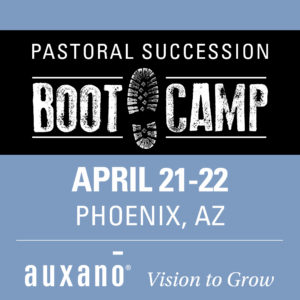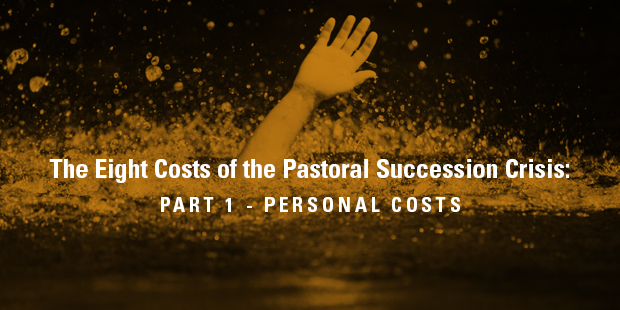The challenge of pastoral succession is a topic of increasing interest for good reason. In the next decade we will see an unprecedented number of pastors hitting retirement age. In a recent study by Barna Research, we learn that the average age of pastors has increased by 10 years over the last 25 years and is currently age 54. In 2017, only 1 of 7 pastors are under age 40. In some denominations, the age is even higher. For example, one denomination, using Auxano’s new pastoral succession toolbox, has a much higher average age than the national norm–40% of it’s pastors are over age 60!
But rather than focusing on the stats of pastoral succession and the coming wave of aging pastors, let’s take a closer look at what happens if we don’t “get succession right.” As a reader you are most likely aware that pastoral succession is a challenging and emotional topic to address for many church leaders. The purpose of this article is to wave a red flag with a spirit that says, “We must have this conversation.” For many church leaders that conversation needs to happen sooner than later. What really is at stake if a senior pastor fails to pass the baton to the next senior pastor? What kind of loss will a church experience if it doesn’t lovingly address this crucial topic at the right time?
To capture the weight of the crisis, I will cover eight costs: four through the personal lens of the pastor himself and four through the lens of the congregation and the resulting broader impact.
The Four Costs to Pastor
Failure to Thrive, Personally
The first cost to the pastor is the overall inability to thrive at a special season in ministry where transition is normative physically, logically and biblically for a leader. As Will Heath, Auxano’s lead navigator for pastoral succession, shares often: “Every leader must move through the natural ministry seasons from “preparing” to “doing” and then to “mentoring.” For example, a Levite priest in the Old Testament shifted the kind of work they performed at age 50. Heath uses this biblical pattern as a guideline for helping pastors shift their “ministry season” to one of increased mentoring. I like the metaphor used by Bob Buford that leaders should navigate a journey from “warrior” to “king” to “sage.” The failure of succession planning keeps leaders working like warriors–laboring heavily like younger men do– when they should be transitioning to a “sage” stage where their experience and wisdom does the “heavy lifting” of work.
Collapse of Trust, Relationally
Usually, people around the leader see clearly the “emotional block” and unwillingness to think through the succession planning question. Over time some of the best and most trusted relationships for the leader, start loosing the bond of solidarity. Ranging from mildly awkward to downright toxic, the entire dynamic of the leadership will shift. If the people in pastor’s sphere of influence are a leadership constellation, the stars will soon begin falling.
Lack of Equipping, Strategically
The irony for the senior pastor who is not preparing to transition is that they rob themselves of the beauty of ministry in the final chapter– one that can and should be defined by equipping others. Robert Clinton in his classic work, The Making of Leader, emphasizes that the greatest fruitfulness in ministry comes in the later years as leaders lead from depth of character and a lifelong of learning. Pastors in their fifties, sixties and seventies have a bank vault of wealth to give away from their personal experiences, but often do so incidentally rather than intentionally. This is most evidenced in how they do the same thing the same way year after year in ministry. That is, they don’t change the mix of “doing ministry” and “developing others.” To use one of my favorite metaphors from Jim Collins they refuse to transition from “time telling” to “clock making.” They simply don’t invest into other leaders who will make the church stronger when their season of leading is finished.
Forfeit of Legacy, Permanently
The most heartbreaking cost, short of moral failure, is the loss of a leader’s legacy when pastoring the flock long beyond their season of effectiveness. Again, it’s so easy for a senior pastor to be blind to their decreasing value as a “ ministry doer.” (Again, they might have amazing fruit as a “leader developer” but they don’t make the transition.) No matter how well a pastor leads over their lifetime, how they finish will mark how they are remembered. It’s like an airplane ride: it doesn’t matter how well your flight attendant service was at 30,000 feet if the plane crash lands.
As you can imagine, the cost is very high for the leader who refuses to build a meaningful succession plan. But that’s not the entire picture, as the costs are even higher for the church. In a follow-up post will walk through the next four costs below.
The Four Costs to Church
- Loss of Momentum, Organizationally
- Drain of Enthusiasm, Silently
- Death of Humility, Symbolically
- Fumbling of Influence, Culturally
What is a Pastor to Do?
Are you at a point to starting thinking about the succession conversation? Are you on a team to where this conversation is overdue?
Think about it: How will people celebrate your leadership when your day at the helm is done? It’s not too soon to prepare.

Tags: Will Mancini, pastoral succession, succession
|
What is MyVisionRoom? > | Back to Execution >






















